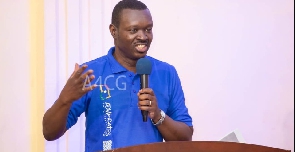Co-Chair of the Citizens Movement Against Corruption, Mr. Edem Senanu has indicated that Ghana’s democracy has been turned upside down.
He told Alfred Ocansey on the Sunrise show on 3FM Monday, April 26 that elected leaders who are supposed to be public servants have rather turned masters being served by the citizens.
This, according to him, is an indication of a democracy that has been turned upside down.
He told Alfred Ocansey on the Sunrise show on 3FM Monday, April 26 that elected leaders who are supposed to be public servants have rather turned masters being served by the citizens.
This, according to him, is an indication of a democracy that has been turned upside down.
He was adding his voice to the concerns raised by businessman Sir Sam Jonah regarding the ills in Ghanaian society.
“What we have done is to turn democracy upside down on its head. The title public servant simply means a servant of the people and yet these days you find that you are virtually obliged to serve them.
“Part of this is traced to our colonial rules. Having said that our own people in many instances have not treated the people of this nation as well as we expected when we said let the colonialist leave and let's have our own people who will be more sensitive and responsive to our needs.
“The Public service is supposed to facilitate the needs and aspirations of the people. In other words, have an engagement and understand what the aspirations of the people are and use your technical expertise to put that in the centre of the discourse and the issues that affect and concern the citizens but that is not what we are seeing,” he said.
Sir Sam Jonah had said among other things that some lawyers have made it their habit to take advantage of situations to delay cases in court,
“Our governments pay lip service to anti-corruption but do little substantially to cure the canker. Which of the major corruption issues has been conclusively dealt with since the fourth Republic began? There have been major corruption scandals and none has been conclusively dealt with.
“I could give you a long list of unsolved corruption cases but there is no need to bore you with something you are all so familiar with. As a friend of mine will say, the problem with corruption is not the absence of laws, but the certainty of punishment. Sadly, there is rather certainty that corrupt people especially in high places will never face punishment.
“And this has bred impunity in those who would rather take it all for themselves through dubious means than serve the common good. We cannot go anywhere if this situation continues. No country can develop without dealing decisively with corruption.
“Days ago, we read shocking news of two teenagers who were arrested for killing a 10-year-old boy for money rituals. This sparked extensive discussion on mainstream as well as social media. Many Ghanaians were expectedly shocked that children of this age were so moved by money that they allegedly killed a human being to get it. But if we were to reflect, we would know that this was merely a symptom of a much more deep-seated problem with the entire Ghanaian society. When our children watch TV, what do they see?
“Too much religiosity without morality; pastors displaying uncouth behaviour by stepping on pregnant women and slapping congregants; people showing how money can be made without hard work, and when they copy what they see, we appear shocked. Let us stop the pretense,” he said.
General News of Tuesday, 27 April 2021
Source: 3news.com
Ghana’s democracy turned upside down – Anti-corruption group
Entertainment












